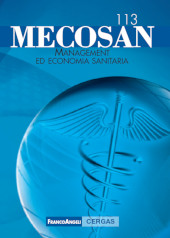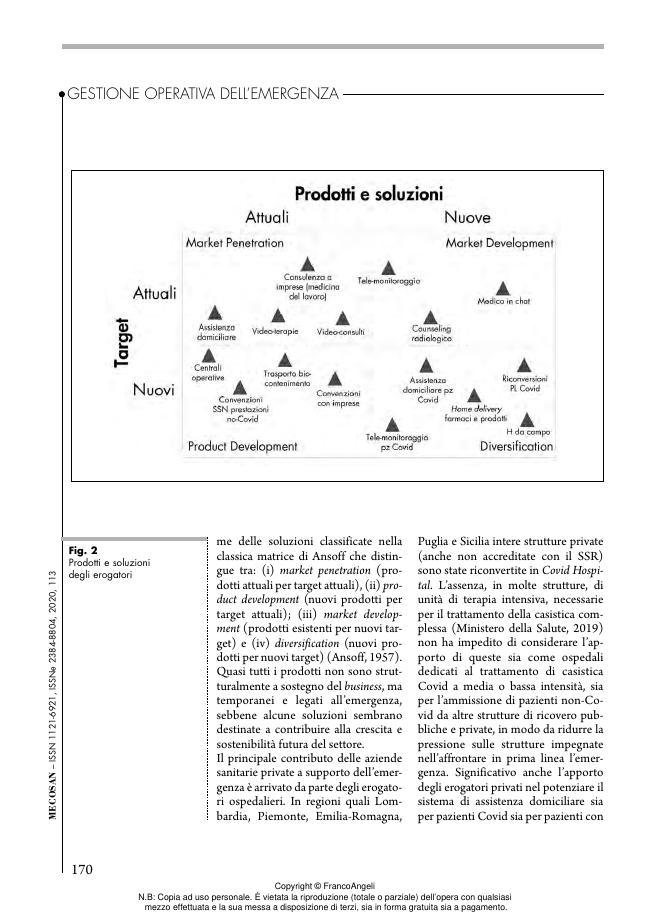Consumi sanitari privati e Covid-19 : esperienze e prospettive
165-175 p.
Questo contributo ha l'obiettivo di fornire una panoramica delle esperienze dei principali player della sanita privata nelle prime settimane di manifestazione del Covid-19 in Italia. L'Osservatorio sui Consumi Privati in Sanita (OCPS) del Cergas-SDA Bocconi ha indagato le ricadute contingenti sulla gestione (sia dal punto di vista dell'organizzazione interna sia nelle relazioni e gestione dei rapporti con gli utenti e interlocutori esterni), i servizi, le soluzioni e le innovazioni messe in campo e gli scenari attesi. L'eccezionalita dell'evento non ha consentito alle aziende di formulare una strategia di crisis management, esse hanno quindi avviato azioni day-by-day per gestire l'emergenza. Le principali criticita hanno riguardato la necessita di garantire la sicurezza del personale e dei pazienti nonostante la carenza dei DPI e la continua e non uniforme variazione delle indicazioni e delle procedure.
Le azioni si sono concentrate sull'adattamento dei processi organizzativi per rispondere alle istanze del Sistema e garantire in sicurezza l'operativita. Sono state potenziate le modalita di relazione digitale nel lavoro (smart working) e nell'erogazione delle prestazioni (video-consulti). In risposta all'emergenza, gli erogatori privati hanno riconvertito le strutture e i player della sanita integrativa sono stati particolarmente attivi nell'estendere servizi e coperture per gli assistiti. Anche le Associazioni hanno rivestito un ruolo importante, mettendo a sistema le informazioni, coordinando gli interventi e avviando nuovi servizi di assistenza agli associati. La ricerca ha evidenziato una insufficiente integrazione tra pubblico e privato. [Testo dell'editore].
This contribution aims to provide a summary of the initiatives experienced by the main actors of private health care during the first weeks of the Covid-19 outbreak in Italy. The Observatory on Privately Financed Health Consumption (OCPS) of Cergas-SDA Bocconi has investigated the impact and repercussions of the outbreak on the internal organization and the relationships with users and external stakeholders, the introduction of new ser vices and innovation, and the expected scenarios in the post-emergency phase. The exceptional nature of the outbreak prevented private health care companies from formulating crisis management strategies and forced them to take action on a day-by-day basis. Main criticisms concerned the guarantee of safety of employees and patients despite the shortage of PPE and a constant and uncoordinated update of instructions and procedures.
Actions focused on the adjustment of the processes to deal with organizational and safety requirements. The emergency has forced the enhancement of digital instruments for workers and patients. In response to the emergency, private health care providers converted their facilities and health insurance players extended services and guarantees for their enrollees. Associations as well have played an important role in sharing information and coordinate the associates. The research highlights a poor ability to create an effective public-private integration. [Publisher's text].
-
Articles from the same issue (available individually)
-
Information
ISSN: 2384-8804
KEYWORDS
- Crisis management, sanita privata, Covid-19
- Crisis management, private healthcare, Covid-19



